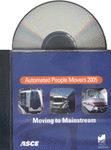Three Financial and Socio-Economic Assessments of a Personal Rapid Transit System
Publication: Automated People Movers 2005: Moving to Mainstream
Abstract
The principles of public transport are the same today as in the stagecoach era. Vehicles operate according to a published schedule, passengers go to a designated stop and wait for the vehicle to arrive. Their journey is interrupted by periodic stops as the vehicle picks up or drops off passengers. If the passenger is lucky the service will have a stop near the desired destination. If not, it will be necessary to transfer to another service or services. The waiting and interchange components of the journey are generally regarded as inconvenient (and, in generalised cost terms, costly). A Personal Rapid Transit (PRT) system uses automatically-driven small vehicles to carry individuals or small groups non-stop from the origin station to the destination station, wherever the stations lie on the network of guideways. Because vehicles can be parked off-line at stations to be immediately available when passengers arrive, or if no vehicle is at the station one can be called up automatically from nearby, waiting times are very short or zero, and since all stations are off-line there are no intermediate stops. Several such systems reached advanced stages of design and development in the UK, Europe and the USA in the early 1970s, but none were put into public operation, though a larger vehicle derivative still operates as a small automated tram to serve a university campus in Morgantown, Virginia, USA. The 1970s proposals were too advanced for the available technology. Such systems could have been made operable, but they were too complex and expensive, and the guideway and infrastructure tended to be large and too visually intrusive to be aesthetically acceptable. Thirty years later, technology has moved on. Control systems which required a room of mainframe computer then can now be run from a laptop. Proposals for PRT are back. The particular system described here has been developed by Advanced Transport Systems Ltd of Bristol. Development of the prototype test track and vehicles was funded in part by the Department for Transport, and the assessments of the PRT system described here were made for DfT and for the European Commission as part of the EDICT project.
Get full access to this chapter
View all available purchase options and get full access to this chapter.
Information & Authors
Information
Published In
Copyright
© 2005 American Society of Civil Engineers.
History
Published online: Apr 26, 2012
Authors
Metrics & Citations
Metrics
Citations
Download citation
If you have the appropriate software installed, you can download article citation data to the citation manager of your choice. Simply select your manager software from the list below and click Download.
